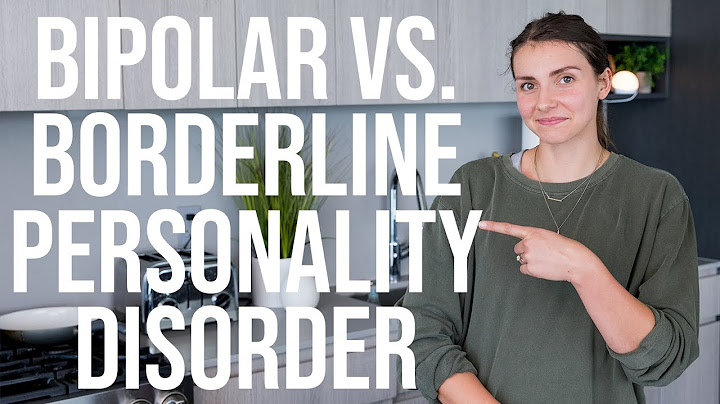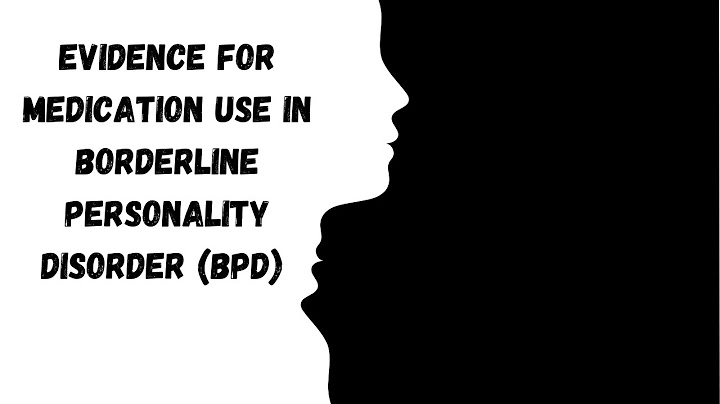Borderline personality disorder (BPD) is a disorder of mood and how a person interacts with others. It's the most commonly recognised personality disorder. In general, someone with a personality disorder will differ significantly from an average person in terms of how he or she thinks, perceives,
feels or relates to others. The symptoms of BPD can be grouped into 4 main areas: The symptoms of a personality disorder may range from mild to severe and usually emerge in adolescence, persisting into adulthood. The causes of BPD are unclear. But as with most conditions, BPD appears to result from a combination of genetic and
environmental factors. People with BPD come from many different backgrounds, but most will have experienced some kind of trauma or neglect as children. If you're experiencing symptoms of BPD, make an appointment with a GP. They may ask about:
This is to rule out other more common mental health conditions, such as depression, and to make sure there's no immediate risk to your health and wellbeing. You may also find Mind a useful website. Find out more about how BPD is diagnosed Treating borderline personality disorder (BPD)Many people with BPD can benefit from psychological or medical treatment. Treatment may involve a range of individual and group psychological therapies (psychotherapy) carried out by trained professionals working with a community mental health team. Effective treatment may last more than a year. Over time, many people with BPD overcome their symptoms and recover. Additional treatment is recommended for people whose symptoms return. Associated mental health problemsMany people with BPD also have another mental health condition or behavioural problem, such as:
BPD can be a serious condition, and many people with the condition self-harm and attempt suicide. Information: Social care and support guideIf you:
Our guide to care and support explains your options and where you can get support. See your GP if you're concerned that you have borderline personality disorder (BPD). They may ask about your symptoms and how they're affecting your quality of life. Your GP will also want to rule out other more common mental health conditions, such as depression, and make sure there's no immediate risk to your health and wellbeing. If
your GP suspects BPD, you'll probably be referred to your local community mental health team for a more in-depth assessment. Ask if the service you're being referred to has experience of working with personality disorders. You may also find the Mind and Emergence websites useful. Community mental health
teams help people with complex mental health conditions such as BPD. However, some teams may focus only on people with psychotic disorders. In other areas, there are complex needs services that may be better placed to help you. Your assessment will probably be carried out by a specialist in personality disorders, usually a psychologist or psychiatrist. AssessmentInternationally recognised criteria are used to diagnose BPD. A diagnosis can usually be made if you answer "yes" to 5 or more of the following questions:
Involving your familyOnce a diagnosis of BPD has been confirmed, it's recommended that you tell close family, friends and people you trust about the diagnosis. There are several reasons for this. Many of the symptoms of BPD affect your relationships with people close to you, so involving them in your treatment may make them aware of your condition and make your treatment more effective. Your family and friends can then remain alert for any behaviour that may indicate you're having a crisis. They may also benefit from local support groups and other services for people in a relationship with a person with BPD. However, the decision to talk about your condition is entirely your own, and your confidentiality will be respected at all times. How do I deal with my borderline personality disorder?Includes what it feels like, causes, treatment, support and self-care, as well as tips for friends and family.. Try to improve your sleep. ... . Think about what you eat. ... . Try to do some physical activity. ... . Spend time outside. ... . Be careful with alcohol or drug use.. Can you reverse borderline personality disorder?Final Thoughts On Whether BPD Is Curable
No, not technically. However, the right treatment plan can meaningfully improve one's ability to function. Plus, borderline personality disorder symptoms are likely to improve over time, and it is possible to recover and go on to experience a full life.
Can borderline personality disorder ever go away?While there is no definitive cure for BPD, it is absolutely treatable. 1 In fact, with the right treatment approach, you can be well on the road to recovery and remission. While remission and recovery are not necessarily a "cure," both constitute the successful treatment of BPD.
|

Related Posts
Advertising
LATEST NEWS
Advertising
Populer
Advertising
About

Copyright © 2024 boxhoidap Inc.

















